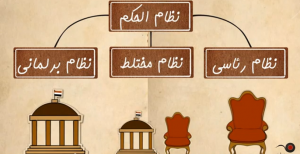
Qabila video
Since the uprising of 25 January, the main topic of conversation on the Egyptian streets has changed from football to politics. Objective information is hard to come by, since most TV channels and media outlets are affiliated with one political party or another. This creates confusion and a fertile ground for rumour and assumption.
With the changing political structure, a whole new set of words and concepts, like constitution, referendum and democracy have been introduced to the language of the street, only adding to the overall confusion.
The internet, which was one of the catalysts of the January uprising, is playing a significant role in increasing social and political awareness. There are several online initiatives that have started producing informative and educational videos to explain the new concepts and situations Egyptians are faced with today.
Straightforward, simple videos tackle a variety of subjects and aim to offer information to the significant amount of people that have had no proper education.
Qabila Media Productions is a prominent example of one such initiative. Qabila, which was founded before the revolution in 2010, was originally intended to provide Egyptians with a parallel media outlet and after the uprising its popularity soared.
Qabila creates animated videos that aim to raise political awareness. They have produced episodes that explain basic political terminologies such as types of governments, functions of parliament and the structure of a civil state. Lately, they have produced a new series called Daleel Al-Muwatin Lifahm Al-Dostour (the citizen’s guide to understanding the constitution), which consists of 14 videos that explain the constitution’s function, history, and structure.
Qabila does not limit its production to only political awareness videos; they have also created live-footage featuring Islamic culture. Their official YouTube channel has 34,000 subscribers and their Facebook page has garnered 143,000 likes.
Noreed.com, a website created in November 2011, is an initiative that aims to strengthen citizen journalism in Egypt. Noreed produced a series of animated videos called Hafez and Fahem, (the one that memorises and the one that understands) that explain political concepts such as the right to peaceful protest, independence of the judiciary and women’s rights.
The website has a monthly competition that encourages Egyptians to turn into active citizen journalists and offers prizes such as laptops, cameras and smart phones to the winners. There are five main areas to compete in; opinion articles, caricatures, photography, news reporting and video reporting.
Fahemny is another new initiative that produces videos that simplify legal and political terms. The initiative has produced six videos so far and their topics are chosen based on what is currently happening in the country. The first video was produced in September and explained the term ‘liberalism’ while their latest video, broadcast on 9 December, explained the term ‘general strike’.
With more internet-based educational activism initiatives starting every day, the days that the net was mostly used to check Facebook have long gone and the function of the internet has undergone its own revolution in Egypt.



